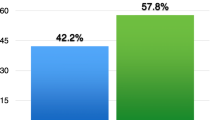Abstract
Objective
This study investigated pharmacological compliance in hypertensive patients recruited during a 24-month period at the Hypertension Clinic of the S. Maria Nuova Hospital.
Methods
The compliance profile scale was developed in order to classify complicance as sufficient, or poor. Compliance was evaluated according to patients’ 1) global cardiovascular risk (hypertensive) and 2) complexity of prescribed treatment at enrolment (drug, number of pills).
Results
A total of 367 patients were recruited; 82 were excluded owing to changes in therapeutic schedule or medication necessitated by other medical or surgical disease. Compliance was evaluated in 285 patients, 66% were male; the mean age was 72±12 years. Compliance was evaluated at a series of follow-ups at 3-month intervals and at 36 months of observation. Compliance at 36 months was good or sufficient in 56% of patients, but differed according to hypertensive and drug status. Compliance was better in patients with a higher level vs lower level of hypertension severity. Specifically, compliance was better in hypertensives with co-morbidity (76%) than in hypertensives without co-morbidity (37%) or hypertensives with risk factors (65%). Moreover, compliance was better in patients with a more complex therapeutic regimen (drug 1 through 3: 47, 59 and 66%).
Conclusions
These data demonstrate a relationship between disease severity and compliance, independent of the prescribed therapeutic regimen. This suggests that the most important factor for therapy adherence is disease awareness and severity, and patients with a higher level of disease are more likely to be compliant.
Similar content being viewed by others
References
Burnier M, Santschi V, Favrat B, Brunner HR. Monitoring compliance in resistant hypertension: an important step in patient management.J Hypertens Suppl 2003; 21: S37-S42.
Tykarski A. Resistant hypertension.Blood Press Suppl 2005; 2: 42–5.
Mar J, Rodriguez Alonso F. Which is more important for the efficiency of hypertension treatment: hypertension stage, type of drug or therapeutic compliance?.J Hypertens 2001; 19: 149–55.
Setaro J, Black H. Refractory hypertension.N Engl J Med 1992; 327: 534–47.
O’Rorke JE, Richardson WS. Evidence based management of hypertension: what to do when blood pressure is difficult to control.BMJ 2001; 322: 1229–32.
Nuesch R, Schroeder K, Dieterle T, Martina B, Battegay E. Relation between insufficient response to antihypertensive treatment and poor compliance with treatment: a prospective case-control study.BMJ 2001; 323: 142–6.
World Health Organization. Adherence to long-term therapies: evidence of action. Geneva: WHO, 2003.
Eraker S, Kirscht J, Becker M. Understanding and improving patient compliance.Ann Intern Med 1984; 100: 258–68.
Mallion J, Baquet J, Siche J, Tremel F, de Gaudemaris M. Compliance, electronic monitoring antihypertensive drugs.J Hypertens Suppl 1998; 16: S75-S79.
Costa FV. Compliance with antihypertensive treatment.Clin Exp Hypertens 1996; 18: 463–72.
Cohen JS. Adverse drug effects, compliance and initial doses of antihypertensive drugs recommended by the Joint National Committee vs. Physicians’ Desk Reference.Arch Intern Med 2001; 161: 880–5.
Melnikow J, Kiefe K. Patient compliance and medical research: issues in methodology.J Gen Intern Med 1994; 9: 96–104.
Urquhart J. Role of patient compliance in clinical pharmacokinetic. A review of recent research.Clin Pharmacokinet 1994; 27: 202–15.
Mallion J, Meilhac B, Tremel F, Calvez R, Bertholom M. Use of a microprocessor equipped tablet box in monitoring compliance with antihypertensive treatment.J Cardiovasc Pharmacol 1992; 19 (Suppl 2): S41-S48.
1999 World Health Organization-International Society of Hypertension Guidelines for the Management of Hypertension. Guidelines Subcommittee.J Hypertens 1999; 17: 151–83.
Wetzels GE, Nelemans PJ, Schouten JS, van Wijk BL, Prins MH. All the glisters is not gold: a comparison of electronic monitoring versus filled prescriptions—an observational study.BMC Health Serv Res 2006; 6: 8.
Menotti A, Blackburn H, Kromhout D, Nissinen A, Adachi H, Lanti M. Cardiovascular risk factors as determinants of 25-year all-cause mortality in the seven countries study.Eur J Epidemiol 2001; 17: 337–46.
Menotti A, Mulder I, Nissinen A, et al. Cardiovascular risk factors and 10-year all-cause mortality in elderly European male populations; the FINE study. Finland, Italy, Netherlands, Elderly.Eur Heart J 2001; 22: 573–9.
Hansson L, Zanchetti A, Carruthers SG, et al. Effects of intensive blood pressure lowering and low dose aspirin in patients with hypertension: principal results of the Hypertension Optimal Treatment randomised trial.Lancet 1998; 150: 341–53.
Degli Esposti E, Sturani A, Degli Esposti L, et al. Pharmacoutilization of antihypertensive drugs: a model of analysis.J Clin Pharmacol Ther 2001; 39: 251–8.
Ambrosioni E, Leonetti G, Pessina AC, Rappelli A, Trimarco B, Zanchetti A. Patterns of hypertension management in Italy: results of pharmacoepidemiological survey on antihypertensive therapy.J Hypertens 2000; 18: 1691–9.
Sarquis LM, Dellacqua MC, Gallani MC, et al. Compliance in antihypertensive therapy: analysis in scientific articles.Rev Esc Enferm USP 1998; 32: 335–53.
Girerd X, Radauceanu A, Achard JM, et al. Evaluation of patients compliance among hypertensive patients treated by specialists.Arch Mal Coeur Vaiss 2001; 94: 839–42.
Sappok T, Faulstich A, Stuckert E, Kruck H, Marx P, Koennecke HC. Compliance with secondary prevention of ischemic stroke.Stroke 2001; 32: 1884–9.
GISSI Prevenzione Investigators. Results of the low-dose (20 mg) pravastatin GISSI Prevenzione Trial in 4271 patients with recent myocardial infarction: do stopped trials contribute to overall knowledge?.Ital Heart J 2000; 1: 810–20.
Egede LE. Lifestyle modification to improve blood pressure control in individuals with diabetes: is physician advice effective?.Diabetes Care 2003; 26: 602–7.
Kennedy JG. What information do patients need about medicines?.BMJ 2003; 327: 862–3.
Almas A, Hameed A, Ahmed B, Islam M. Compliance to antihypertensive therapy.J Coll Physicians Surg Pak 2006; 16: 23–6.
Author information
Authors and Affiliations
Corresponding author
Rights and permissions
About this article
Cite this article
Lagi, A., Rossi, A., Passaleva, M.T. et al. Compliance with therapy in hypertensive patients. Int Emergency Med 1, 204–208 (2006). https://doi.org/10.1007/BF02934738
Received:
Revised:
Accepted:
Issue Date:
DOI: https://doi.org/10.1007/BF02934738




